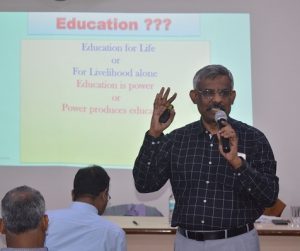Maher Spurgeon, the United Board’s senior consultant for Sou th Asian programs, draws on his background as an ordained minister and former chaplain on Indian college campuses to describe his understanding of whole person education. “Whole person education, in the Indian context, insists on more than just learning for the sake of learning,” he said. “It should also be learning for the sake of living and living together.” From that perspective, team building is as important to meaningful education as academic knowledge and inquiry. Therefore, Dr. Spurgeon recommends that Indian college and university faculty and leaders take steps to strengthen human relations at their institutions through such means as celebrating plurality, cultivating trust, developing communication skills, and working toward common goals.
th Asian programs, draws on his background as an ordained minister and former chaplain on Indian college campuses to describe his understanding of whole person education. “Whole person education, in the Indian context, insists on more than just learning for the sake of learning,” he said. “It should also be learning for the sake of living and living together.” From that perspective, team building is as important to meaningful education as academic knowledge and inquiry. Therefore, Dr. Spurgeon recommends that Indian college and university faculty and leaders take steps to strengthen human relations at their institutions through such means as celebrating plurality, cultivating trust, developing communication skills, and working toward common goals.
“Plurality and diversity are core strengths in India,” Dr. Spurgeon said, “so in all our projects, we should note the importance of working with different types of people, to accept others as they are, and to celebrate plurality.” That means that educators need to push back against current societal trends, which seem to shift toward uniformity and environments in which people only seek out those who share the same language, faith group, or cultural background. They also need to invest time and effort in cultivating trust among their colleagues. “We need to recognize that relationships are permanent, not temporary, and they should be based on love, not likes and dislikes,” he said. “With love, we can bring about change.”
Understanding and sharing a common goal are central to building strong teams that can address current and future challenges. Yet “leaders may not always take the time to share their goals with people at all levels of the institution,” Dr. Spurgeon finds, “or they only frame the goals from the top to the bottom.” When leaders consistently communicate their institution’s mission or vision statement, in words, actions, and aspirations, they help faculty internalize its values and apply them inside and outside the classroom.
Dr. Spurgeon believes that faculty should feel called to their vocation. “Teachers need to understand that their work is more than fulfilling the syllabus,” Dr. Spurgeon said. “How can they help instill the ethos of the institution in their students, through their teaching or through activities outside the classroom? How can they prepare their students to be good Indian citizens and global citizens?” Building relationships with their colleagues and developing effective communication skills – both verbal and nonverbal – can help educators respond to these types of questions.
Dr. Spurgeon and other resource persons at recent United Board faculty development workshops in India have been pleased with the enthusiasm of participants. “Even senior participants say they wish they could have attended something like this 20 years ago,” he said, “and many participants want to see their entire department receive this type of training.” The challenge is to give participants the skills, confidence, and experience needed to share their training with others and build up strong institutions for whole person education.
